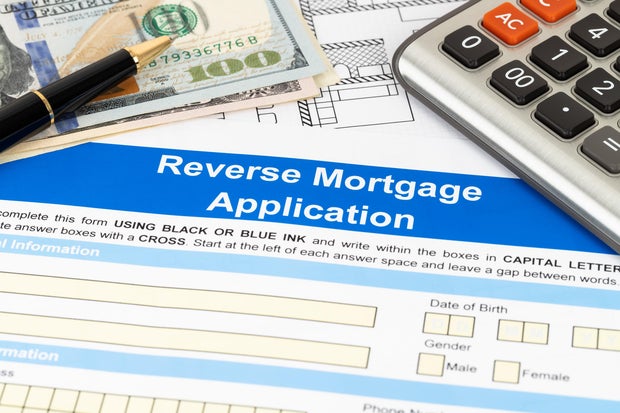Is a reverse mortgage worth it? Here's what experts think
As the U.S. copes with a potential recession and ongoing inflation, many Americans are examining their budgets to see how they can muster up some extra cash.
For homeowners who are at least 62, one place may be right under your nose. If you've built up a significant amount of home equity, you may be able to borrow against it through a reverse mortgage. But should you? We asked a few experts for their opinion.
Start exploring your reverse mortgage options here to see how much you could get.
Reverse mortgage pros and cons
Reverse mortgages can be a helpful solution if you've paid off your home and want to supplement your income in retirement. They grant you access to your equity without requiring you to sell your home and don't require you to make loan repayments until you move, sell, or pass away.
However, they do come with a few potential drawbacks. "Ultimately, the loan terms can put the homeowner, spouse, and heirs at risk of losing money and a place to live," says Chuck Czajka, a certified estate planner and the founder of Macro Money.
Reverse mortgage pros
- It can supplement retirement income.
- No payments are due until you move, die or sell the home.
- It can protect against loan costs exceeding the home's value.
- You can liquify equity without selling the home.
Reverse mortgage cons
- You can lose home equity and reduce your heir's inheritance.
- You must still pay property taxes, homeowners insurance, HOA fees, etc.
- You must live in the house as your primary residence or the loan will become due.
When a reverse mortgage is worth it
So should you get a reverse mortgage? There are some times it could be valuable, experts say.
"A reverse mortgage may be worth it for a homeowner if they meet the following criteria: they have substantial equity in their home, they plan to stay in the home for more than five years, their current income is not sufficient to cover all of their expenses, and they don't have other sources of retirement income that can cover the costs," says Carmelo Carrasco, a realtor and the co-founder of Axel Property Management.
He adds, "A reverse mortgage might also be worth it for some homeowners if they're able to use the additional funds from the loan to purchase an annuity, invest in stocks or bonds, or invest in a guaranteed income stream."
Further, it can help those who want a source of backup funds. "Oftentimes, people think reverse mortgages are a last resort and that couldn't be further from the truth," says Jay Dacey, the president of the Jay Dacey Mortgage Team Inc. "Many clients that have significant assets/net worth appreciate that when the stock market is down, they can leverage their equity instead of selling investments," he explains.
Explore your reverse mortgage options to see if it's worth it for you.
When an alternative may be better
On the other hand, a reverse mortgage alternative may be better in some scenarios.
"Some parents want to leave every penny of equity to their heirs and a reverse mortgage takes monthly bites out of that equity as the mortgage balance rises," says Kevin W. Walton, a reverse mortgage loan originator and Registered Social Security Analyst.
It also won't be the best fit if you plan to rent out the property or move before you'd like to pay off the balance. Walton explains, "You can't rent out the property or use it for a BNB. Once you cease to live in the property as your owner-occupied residence, the loan must be paid off.
"Additionally, if a child or children live with you and you pass away, the loan must be paid off or the child must get their own loan to pay off the existing reverse mortgage balance. Kids who can't afford housing would be put in a difficult situation in this case," adds Walton.
"It may be better in the long to buy a different property. Take your equity and roll it into a property that is more enjoyable and fits your lifestyle," says Walton, "Or, if the borrower can income qualify and it's for a short term, a HELOC is cheaper to originate and you can obtain a higher loan amount than what the reverse mortgage can give."
Mike Gregor, a realtor at Cohen Agency SiM, LLC offers advice along the same lines, saying "A home equity loan or line of credit may be a better choice for homeowners who want to access their home equity without affecting their ability to leave an inheritance to their heirs. These options typically have lower upfront costs and interest rates than a reverse mortgage, and the loan balance is repaid in monthly payments rather than accumulating over time."
How does a reverse mortgage work?
If you're eligible, a reverse mortgage lets you borrow against your home equity and doesn't require any repayments until you move, pass away, or sell your home.
Eligibility requirements
Home Equity Conversion Mortgages (HECMs), which account for the majority of reverse mortgages, require borrowers to be at least 62 years old to qualify. You'll also need to live in the home as your primary residence, have funds to pay for the other expenses associated with the property, and get approved by a lender; amongst other requirements. HECMs are insured by the U.S. Federal Government and are only available through FHA-approved lenders.
Loan options
If your reverse mortgage application is approved, the lender will give you a borrowing limit based on your home value, the amount of equity you have, your age and the interest rate for which you're qualified. From there, you can opt for a line of credit, monthly payments or a lump sum payment.
Interest and fees
HECM lines of credit and monthly payments come with adjustable interest rates which only apply to funds you've drawn. The lump sum payment option comes with a fixed interest rate which is charged on the full amount starting when the loan closes. You'll also need to pay an initial mortgage insurance premium (MIP), ongoing MIPs, an origination fee, closing costs and a counseling fee.
Explore your reverse mortgage options to learn more.
Is a reverse mortgage right for you?
Reverse mortgages can be helpful in a variety of situations, but they come with a few potential dealbreakers. Whether or not you should get one will depend on your unique financial situation and goals. "It's essential for homeowners to carefully consider their options and seek guidance from a financial advisor or a HUD-approved counselor before making a decision," says Gregor.
Want to take the next steps? Learn more about how to get a reverse mortgage.




